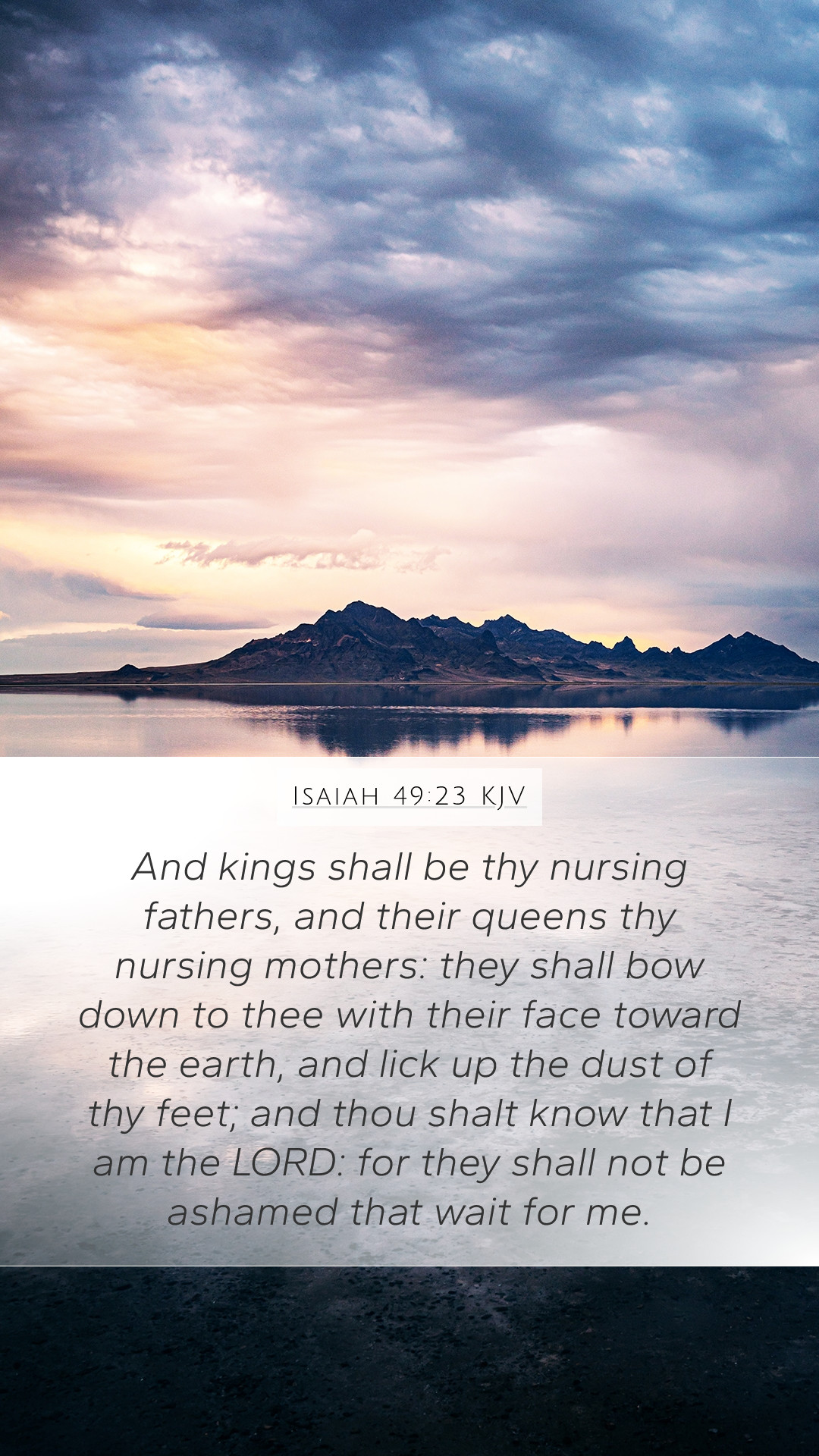Understanding Isaiah 49:23
The verse Isaiah 49:23 states, "Kings shall be your foster fathers, and their queens your nursing mothers; they shall bow down to you with their faces to the earth, and lick up the dust of your feet. Then you will know that I am the Lord; those who wait for me shall not be put to shame." This verse is rich in meaning and significance, reflecting themes of divine providence, honor, and the restoration of Israel.
Below is a collective interpretation of this verse from notable public domain commentaries, which provide deeper insights into its meaning.
Bible Verse Commentary
Isaiah 49:23 is a prophetic declaration pertaining to Israel's future restoration and exaltation. It presents a striking image of kings and queens serving Israel, indicating that even the highest authorities will recognize and support God’s people.
1. The Role of Kings as Nurturers
- Matthew Henry's Commentary: Henry emphasizes the transformative power of God's grace, suggesting that powerful leaders will become caretakers of Israel. This reflects God’s promise to elevate His people in the eyes of those who once oppressed them.
- Albert Barnes' Notes: Barnes notes that royal figures coming to serve Israel symbolize the reversal of fortunes, declaring that the humiliation of the past will give way to honor in the future. He interprets the imagery of 'foster fathers' and 'nursing mothers' as gentile leaders who will show affection and care towards God’s people.
- Adam Clarke's Commentary: Clarke points out that the language implies a deep respect and acknowledgment of God’s sovereignty. Leaders will bow down, acknowledging the power of the Lord and the chosen status of Israel.
2. The Significance of Bowing Down
Bowing down, as mentioned in the verse, signifies profound respect and acknowledgment of authority. This action conveys that nations will honor God’s plan for Israel, resulting in a dramatic shift in their previous attitudes.
3. Waiting for the Lord
- Hope and Assurance: The phrase "those who wait for me shall not be put to shame" offers a promise of hope. It signifies that those who remain faithful and patient in their trust in God will ultimately witness His deliverance and vindication.
- Spiritual Endurance: The commentary reflects this steadfastness as a necessary element in understanding the Christian journey. It encourages believers to hold firm, contrasting earthly troubles with divine rewards.
Application of Isaiah 49:23
This verse holds significant application for modern believers. It reassures them of God's ongoing work in their lives and the world, emphasizing the importance of patience and faithfulness.
- In Daily Life: Understanding and applying this verse can motivate believers to wait expectantly on God's promises, trusting that He will elevate them in His timing.
- Bible Study Groups: This passage can serve as a focal point for discussion in Bible study groups, exploring themes of faith, divine favor, and the importance of humility.
- Online Bible Study Tools: Utilizing online resources can help deepen the understanding of this verse, allowing for comparison with other scriptures and insights.
Cross-References
For a broader context, consider the following cross-references:
- Isaiah 60:3: Discusses nations coming to the light of Israel, paralleling the theme of honor and recognition.
- Psalms 72:10-11: Highlights the kings of the earth bringing tribute to the Lord’s anointed.
- Romans 10:11: Affirms the promise that those who believe in the Lord will not be put to shame.
- Isaiah 54:17: Declares that no weapon formed against Israel will prosper, reinforcing themes of protection and vindication.
- Zechariah 8:23: Prophesies a time when people will seek the Lord with a sense of urgency, echoing the promise of support and honor for Israel.
Conclusion
The verse Isaiah 49:23 serves as a profound reminder of God’s promise to honor and restore His people. It reflects the dynamics of power, respect, and faithfulness, urging believers to trust in God's plan with hope and expectation. Through a careful study of the interpretations and applications found in biblical commentaries, one can gain a deeper understanding of this verse and its implications for faith.


